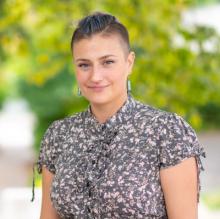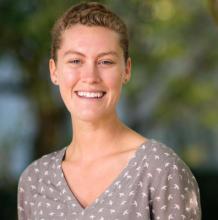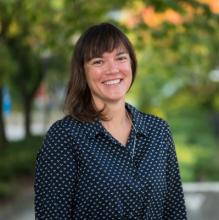The goal of staging a play that belongs to the contemporary Mexican theatre canon in Western Canada, is to foster a conversation with audiences not only about the play itself, but also but interculturalism, and our similarities and differences.
Research Description
My PSI project proposes to do a full production of The Sky on the Skin, my translation of Mexican playwright Edgar Chías, El cielo en la piel. The goal of staging a play that belongs to the contemporary Mexican theatre canon in Western Canada, is to foster a conversation with audiences not only about the play itself, but also but interculturalism, and our similarities and differences. By opening these issues through the practice of theatre translation, I see to use this production to generate compassion, understanding, and care towards one another, and thus help audiences bridge gaps in their understanding of and feelings towards minorities, such as Mexicans, in these politically charged times. The production, however, will not only seek to provide access to, and understanding of, contemporary Mexican culture, but through translation and adaptation, it will also speak to the experience of other minority groups in Vancouver. The cast of this production of The Sky on the Skin will consist of three Mexican actors, an unusual cast for a production staged in Vancouver, the purpose of this casting choice being to generate more dialogue among the Canadian audiences about those in our midst who often experience discrimination and marginalization. The production seeks to give space on stage to voices and bodies that are often marginalized, but also encourage others who have not experienced this kind of discrimination and threat of physical harm to think about and have empathy for the experiences of others in the community. The scholarly objective of this production is to analyze the reactions of the audiences of these shows, using a purpose-devised survey, to get a deeper understanding of the impact of a foreign play when presented in a form that resonates with their own cultural context, but that also shares with them something about Mexican culture.
What does being a Public Scholar mean to you?
It signifies an opportunity to show people beyond UBC the impact that translation has had in the study, dissemination, and practice of theatrical cultures around the world, and allows me to start a conversation with audiences that will benefit from more theatre from around the world being translated and produced locally. In particular, being a Public Scholar means that I get a platform where to showcase not only my homecountry's contemporary playwrighting, through the staging of "The Sky on the Skin" by Edgar Chías from México, but also my translation of it into English, and a production concept that will hopefully resonate not only with Mexican people in BC, but with every person who gets to experience it, because of its powerful perspective on violence against women.
In what ways do you think the PhD experience can be re-imagined with the Public Scholars Initiative?
It helps break assumptions on the impact of scholarly research in "the real world". It bridges gaps that aren't always as easy to cross, as scholarly publications, conferences, and other outlets are rarely exposed to wider audiences, the same that may have the interest to develop further knowledge on a particular area. The PSI helps one as a scholar to have a way to show what you've been working on, in a way that more people, beyond UBC, can experience it.
How do you envision connecting your PhD work with broader career possibilities?
I believe that the practice of theatre translation can intersect with several fields such as community work and different types of therapy, and that many immigrants in Vancouver would really appreciate knowing that, through theatre, there is a way to maintain a connection with their origin cultures, to understand them, and allow others to have that understanding for them too.
How does your research engage with the larger community and social partners?
My work at UBC is social at nature, not only because I need of the community to go and see the plays I translate and produce, but most importantly because it is through the study of the local theatre culture, and the translation of México's theatre theory and playwrighting, that I've been able to think of ways to translocate theatre between the Canadian and Mexican cultures. In order to do so, I always need to consider the context: where am I staging certain play, and most importantly, what is it saying and why?
Why did you decide to pursue a graduate degree?
Because I have always been an avid learner, someone who likes to delve into knowledge from different sources to understand something better. In particular, because I know that education brings different perspectives on subjects, and that is through questioning those perspectives that I get to grow the most.
Why did you choose to come to British Columbia and study at UBC?
Because I researched UBC and learned about its solid research reputation, and then UBC decided to give me the opportunity to pursue my PhD degree in Theatre through a generous scholarship, so it was the best case scenario for me!
I have always been an avid learner, someone who likes to delve into knowledge from different sources to understand something better.




